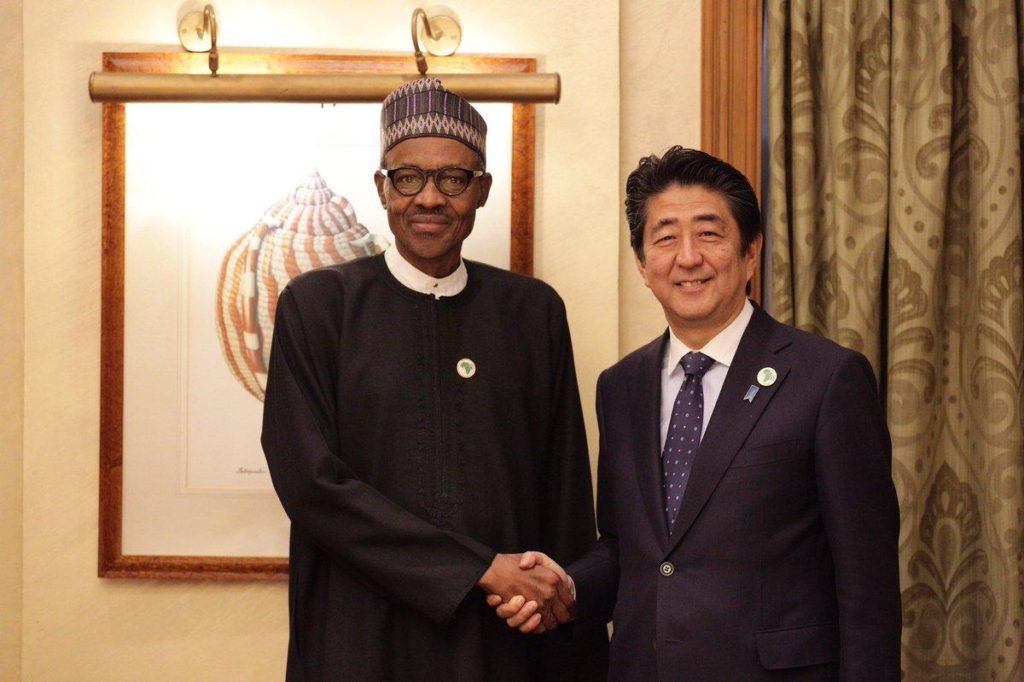
President Muhammadu Buhari has said that security in the Gulf of Guinea, which is greatly affected by piracy and armed robbery at sea, is a priority for his government.
“We have provided funds to our Navy to buy new platforms, train and effectively organize the personnel to protect the area.
“We are looking forward to support from developed nations for satellite surveillance covering the Gulf,” Buhari said at a bilateral meeting with Japanese Prime Minister, Shinzo Abe, on the sidelines of the sixth Tokyo International Conference on African Development (TICAD) in Nairobi.
He also said that his government would deal with Niger Delta militants responsible for the destruction of the country’s petroleum infrastructure the same way it dealt with Boko Haram in the Northeast.
According to a statement issued in Abuja on Sunday by the President’s Senior Special Assistant on Media and Publicity, Mallam Garba Shehu, the President told the Japanese leader that “with the defeat of the Boko Haram terrorists by the military, attention of my administration is now focused on stopping the destruction of the country’s economic assets by militants in the Niger Delta’’.
He said that the militants must dialogue with the Federal government or be dealt with in the same way like Boko Haram.
“We are talking to some of their leaders; we will deal with them as we dealt with Boko Haram if they refuse to talk to us.
“As a government, we know our responsibility, which is to secure the environment.
“It is clear to us that lenders won’t fund projects in insecure environments.
“We realize that we have to secure the country before we can efficiently manage it,’’ Buhari said.
The President also reassured existing and prospective foreign investors that their investments in Nigeria were secured and would be fully protected.
The president outlined several steps taken by his administration to secure the country and ease of doing business in Nigeria.
Buhari recalled his audience with G7 leaders in Germany, and thanked Japan for responding positively to Nigeria’s requests for the rehabilitation of victims of Boko Haram and rebuilding of infrastructure in the Northeast of the country.
He, however, stated that there was still more to do on education, health and other infrastructure to ensure quick and voluntary return of displaced persons to their communities.
On the United Nations Security Council reform, the president agreed to work with Japan for the reforms, stressing that the case for a permanent seat for Africa on the council was a moral one.
He also expressed Nigeria’s support for Japan in its bid for a UN resolution on the problems in East China and South China as well as the “uncontrolled nuclear tests by North Korea.’’
According to him, the UN system is sufficient for the resolutions of all disputes and no nation should be above the United Nations.
“This has to be made absolutely clear and I assure the prime minister that I will meet as many leaders as possible at the forthcoming UN General Assembly concerning the issues,’’ he added.
In his remarks, Abe congratulated Buhari “for courageously tackling Boko Haram terrorism”.
He said Nigeria and Japan must work together to improve the investment climate in view of the many Japanese companies wishing to invest in Nigeria.
Abe reaffirmed Japan’s commitment to rapid development in Nigeria through quality delivery of ongoing projects in the country, including Jebba hydro power scheme and the Lagos railway project.